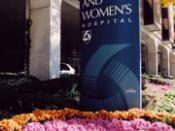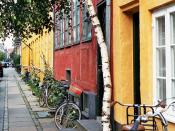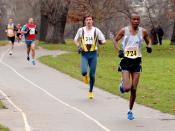Summary Paper
The Fortune Teller
"Will the secrets of genetic destiny bring comfort or only
more sorrow to a remote land ravaged by violence?"
The Fortune Teller, Kenneth S. Kosik, The Sciences, Jul/Aug 1999, pp.13-17.
Kenneth S. Kosik is a professor of neurology at Harvard Medical School and an attending physician at Brigham and Women's Hospital in Boston, where he was a cofounder of the Memory Disorders Clinic. In October of 1992, he was introduced to neurologist Francisco Lopera. Lopera had tracked 12 interrelated families living in Columbia, all suffering from a mysterious early-onset form of dementia. Kosik agreed to assist Lopera in a search for the gene mutation responsible for what they were to find was a rare from of Alzheimer's. As they do their research this disease, Kosik finds himself in a position where he is able to tell if someone will die of this disease, with a simple blood test done at any age.
Forced to decide whether or not people should have this information, Kosik asks himself "Will knowledge of their destiny bring comfort, or only more sorrow?"
Because of religious beliefs and cultural traditions, Kosik found it difficult to find a deceased individual to examine. The only way to diagnose Alzheimer's definitively is to do a microscopic study of brain tissue. They were finally able to get their tissue sample, however, and proved that the disease was, in fact, Alzheimer's.
This form of Alzheimer's, the kind that strikes the young, leaves the same signs in the brain as the more common variety: knotty clumps of beta-amyloid, a type of protein. Kosik's hope is that an understanding of this rare form of the disease will lead to a treatment or cure for the common one. A search for the gene at fault was begun.
Shortly before the gene was located, a meeting between the researchers and the affected families was held. The families were indeed aware of the trend in their families, but for the most part could not comprehend how the disease was inherited by some, and not all. The meeting did put to rest several superstitions of the disease, though. (Touching a particular type of tree was believed to give you the disease.)
After the discovery of the gene responsible, it was possible, from a simple blood test, to determine if an individual would develop the disease. Having the gene meant two things: 1. you could pass it on to your children. 2. you would absolutely get the disease, unless you died from other causes beforehand. When Kosik asked one family if they would like to know if they carried the gene or not, understanding that there was no cure or treatment, everyone who was asked said they wanted to know. One young man also said that if he had the gene, he would shoot himself.
Kosik and Lopera have decided that because of the lack of counselling programs available, the gene test will be given for research purposes only, and that even then the results will no be given to the person tested. Kosik is somewhat uncomfortable with this decision because he feels that the knowledge of being a carrier would discourage reproduction, and thus lower the future incidences of the disease, but seems to not be able to make himself tell someone how they are going to die.
Kosik stood at the point where one day, we all may stand. Someday, we will likely all have the ability to learn of our genetic makeup. Kosik points out that knowledge of this genetic makeup will have profound impacts on our lives. He says "We stand poised to be expelled from an Eden of genetic ignorance into a society where every talent and weakness, every wrinkle and freckle may be predicted from our genomes." He also warns of genetic discrimination, and even goes as far as to suggest that "... the knowledge of our genetic destiny will rob us first of opportunity, and later of all hope."


